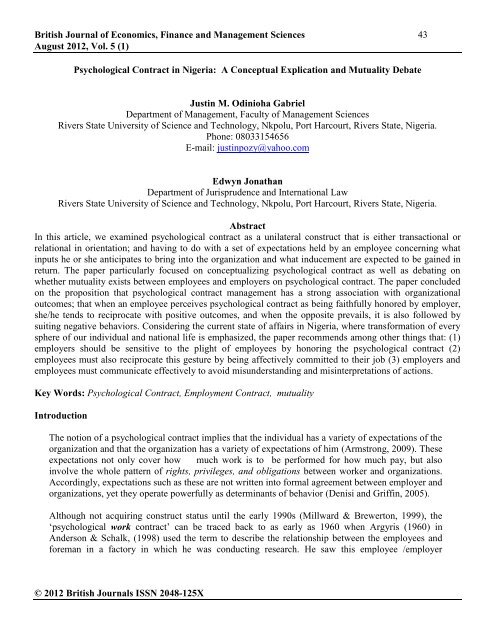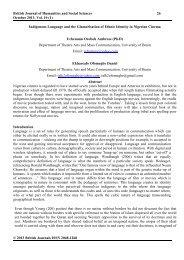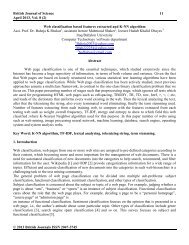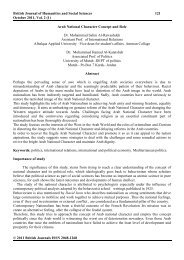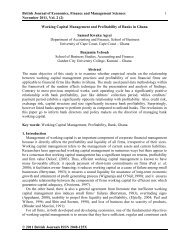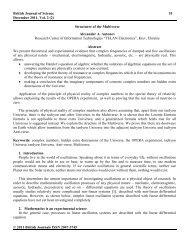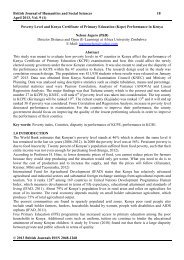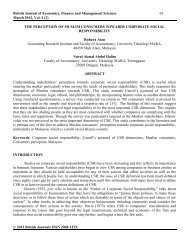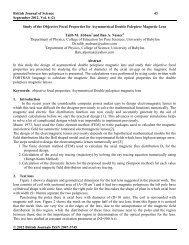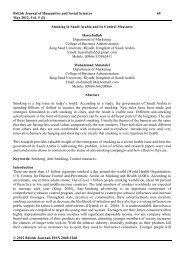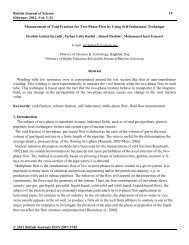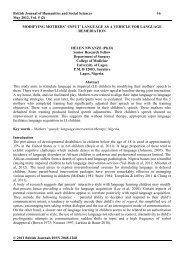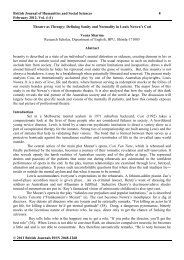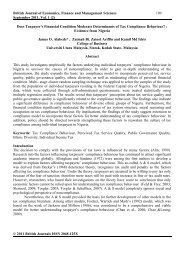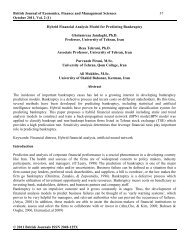Psychological Contract in Nigeria - British Journal of Science
Psychological Contract in Nigeria - British Journal of Science
Psychological Contract in Nigeria - British Journal of Science
Create successful ePaper yourself
Turn your PDF publications into a flip-book with our unique Google optimized e-Paper software.
<strong>British</strong> <strong>Journal</strong> <strong>of</strong> Economics, F<strong>in</strong>ance and Management <strong>Science</strong>s 43August 2012, Vol. 5 (1)<strong>Psychological</strong> <strong>Contract</strong> <strong>in</strong> <strong>Nigeria</strong>: A Conceptual Explication and Mutuality DebateJust<strong>in</strong> M. Od<strong>in</strong>ioha GabrielDepartment <strong>of</strong> Management, Faculty <strong>of</strong> Management <strong>Science</strong>sRivers State University <strong>of</strong> <strong>Science</strong> and Technology, Nkpolu, Port Harcourt, Rivers State, <strong>Nigeria</strong>.Phone: 08033154656E-mail: just<strong>in</strong>pozy@yahoo.comEdwyn JonathanDepartment <strong>of</strong> Jurisprudence and International LawRivers State University <strong>of</strong> <strong>Science</strong> and Technology, Nkpolu, Port Harcourt, Rivers State, <strong>Nigeria</strong>.AbstractIn this article, we exam<strong>in</strong>ed psychological contract as a unilateral construct that is either transactional orrelational <strong>in</strong> orientation; and hav<strong>in</strong>g to do with a set <strong>of</strong> expectations held by an employee concern<strong>in</strong>g what<strong>in</strong>puts he or she anticipates to br<strong>in</strong>g <strong>in</strong>to the organization and what <strong>in</strong>ducement are expected to be ga<strong>in</strong>ed <strong>in</strong>return. The paper particularly focused on conceptualiz<strong>in</strong>g psychological contract as well as debat<strong>in</strong>g onwhether mutuality exists between employees and employers on psychological contract. The paper concludedon the proposition that psychological contract management has a strong association with organizationaloutcomes; that when an employee perceives psychological contract as be<strong>in</strong>g faithfully honored by employer,she/he tends to reciprocate with positive outcomes, and when the opposite prevails, it is also followed bysuit<strong>in</strong>g negative behaviors. Consider<strong>in</strong>g the current state <strong>of</strong> affairs <strong>in</strong> <strong>Nigeria</strong>, where transformation <strong>of</strong> everysphere <strong>of</strong> our <strong>in</strong>dividual and national life is emphasized, the paper recommends among other th<strong>in</strong>gs that: (1)employers should be sensitive to the plight <strong>of</strong> employees by honor<strong>in</strong>g the psychological contract (2)employees must also reciprocate this gesture by be<strong>in</strong>g affectively committed to their job (3) employers andemployees must communicate effectively to avoid misunderstand<strong>in</strong>g and mis<strong>in</strong>terpretations <strong>of</strong> actions.Key Words: <strong>Psychological</strong> <strong>Contract</strong>, Employment <strong>Contract</strong>, mutualityIntroductionThe notion <strong>of</strong> a psychological contract implies that the <strong>in</strong>dividual has a variety <strong>of</strong> expectations <strong>of</strong> theorganization and that the organization has a variety <strong>of</strong> expectations <strong>of</strong> him (Armstrong, 2009). Theseexpectations not only cover how much work is to be performed for how much pay, but also<strong>in</strong>volve the whole pattern <strong>of</strong> rights, privileges, and obligations between worker and organizations.Accord<strong>in</strong>gly, expectations such as these are not written <strong>in</strong>to formal agreement between employer andorganizations, yet they operate powerfully as determ<strong>in</strong>ants <strong>of</strong> behavior (Denisi and Griff<strong>in</strong>, 2005).Although not acquir<strong>in</strong>g construct status until the early 1990s (Millward & Brewerton, 1999), the‘psychological work contract’ can be traced back to as early as 1960 when Argyris (1960) <strong>in</strong>Anderson & Schalk, (1998) used the term to describe the relationship between the employees andforeman <strong>in</strong> a factory <strong>in</strong> which he was conduct<strong>in</strong>g research. He saw this employee /employer© 2012 <strong>British</strong> <strong>Journal</strong>s ISSN 2048-125X
<strong>British</strong> <strong>Journal</strong> <strong>of</strong> Economics, F<strong>in</strong>ance and Management <strong>Science</strong>s 44August, Vol. 5 (1)relationship as be<strong>in</strong>g dom<strong>in</strong>ated by an environment with<strong>in</strong> which the employees would ma<strong>in</strong>ta<strong>in</strong> highproduction with m<strong>in</strong>imal grievances if the foreman respected the norms <strong>of</strong> their <strong>in</strong>formal culture.The purpose <strong>of</strong> this paper therefore is to among other th<strong>in</strong>gs discuss (1) The conceptualize <strong>of</strong>psychological work contracts, (2) Its formation and content engage (3) The question <strong>of</strong> mutuality, and thenormally shared perceptions between two parties concern<strong>in</strong>g contract obligations, and (4) conclude andmake some recommendations.Conceptualiz<strong>in</strong>g <strong>Psychological</strong> <strong>Contract</strong>The psychological contract def<strong>in</strong>es what the <strong>in</strong>dividual expects from the organization <strong>in</strong> order to achieve andma<strong>in</strong>ta<strong>in</strong> psychological wellbe<strong>in</strong>g. Individuals are attracted to an organization because they believe theorganization has the potential to contribute to their wellbe<strong>in</strong>g. What that contribution will be, and how it willbe delivered, is embedded <strong>in</strong> both the formal employment contract and the psychological work contract. Ifeither contract is breached or violated, the <strong>in</strong>dividual will act to address the perceived <strong>in</strong>justice. The workeremployerpsychological contract is a huge force <strong>in</strong> the work relationship dynamics.From the employer’s view, employees do not have lifetime jobs, guaranteed advancement or raises, orassurance that their work roles will be fixed. However, the most admired employers believe that openness,<strong>in</strong>tegrity, provid<strong>in</strong>g opportunities, and support<strong>in</strong>g the growth and development <strong>of</strong> their employees are toppriorities. They perceive this as the unwritten contract they have with their people. On the other hand,employees believe that employers must be honest, open, and fair and also will<strong>in</strong>g to give workers a large say<strong>in</strong> their jobs. As Allen (1995) claimed, supported by Brown (1996), an assessment <strong>of</strong> how personallybeneficial or detrimental the work environment is to their wellbe<strong>in</strong>g, and whether the organization caresabout their wellbe<strong>in</strong>g, is cont<strong>in</strong>ually be<strong>in</strong>g made by employees. This assessment will <strong>in</strong>fluence the extent towhich employees have themselves engaged <strong>in</strong> the workplace (Kahn, 1990).The <strong>Psychological</strong> <strong>Contract</strong>: Formation and ContentHow psychological work contracts form is answered simply by Andersson (1996), who suggested that acontract emerges when an employee perceives that the organization is obligated to reciprocate <strong>in</strong> somemanner <strong>in</strong> response to contributions he or she has made. The process <strong>of</strong> psychological contract formation,appraisal, and assessment is iterative and provides both the structure <strong>of</strong> the contract and its content. With<strong>in</strong>that structure, and based on the content, the contract establishes the mechanisms (constructive, <strong>in</strong>terpretive,and corrective) through which <strong>in</strong>dividuals seek mean<strong>in</strong>g from the work they pursue, and from theorganizational climate and environment with<strong>in</strong> which that work is performed.As Sonnenberg (1997) proposed, expectations or hopes <strong>of</strong> personal development, reward, adjustment andregulation are generally present <strong>in</strong> the work one is engaged <strong>in</strong>. Individuals enter an organization with a set <strong>of</strong>beliefs, values, and needs, and with the expectation that these will be met, upheld, and respected, and theirwellbe<strong>in</strong>g ensured, preserved, and protected. This is the socialization process referred to as ‘sense mak<strong>in</strong>g’by de Vos, Buyens, and Schalk (2003).The core <strong>of</strong> the psychological contract concerns the exchange <strong>of</strong> promises and commitments (Guest &Conway, 2001a). With<strong>in</strong> this context, the content <strong>of</strong> the contract is about cognitions, perceptions,expectations, beliefs, promises, and obligations. That is, it is concerned with non-tangible psychologicalissues (Mak<strong>in</strong>, Cooper, & Cox, 1996). These cognitions, perceptions, and expectations, and so forth, form© 2012 <strong>British</strong> <strong>Journal</strong>s ISSN 2048-125X
<strong>British</strong> <strong>Journal</strong> <strong>of</strong> Economics, F<strong>in</strong>ance and Management <strong>Science</strong>s 45August, Vol. 5 (1)part <strong>of</strong> the psychological and implicit employment contract coexist<strong>in</strong>g with the explicit, formally documentedand legally b<strong>in</strong>d<strong>in</strong>g contract <strong>of</strong> employment.Coyle-Shapiro and Conway (2005) suggested that, with<strong>in</strong> the context <strong>of</strong> social exchange, the psychologicalcontract is one way <strong>of</strong> operationaliz<strong>in</strong>g the employee-employer exchange. Understand<strong>in</strong>g employeeexpectations relat<strong>in</strong>g to that social exchange may help identify the factors that shape employee perceptions <strong>of</strong>the psychological contract. One <strong>of</strong> those factors is reciprocity which provides a basis for a global evaluation<strong>of</strong> the employment relationship by the employee (Coyle-Shapiro & Conway, 2005). The evaluation <strong>of</strong> theemployment relationship by the <strong>in</strong>dividual is <strong>in</strong> itself likely to <strong>in</strong>fluence the content <strong>of</strong> the psychologicalcontract.Although no totally encompass<strong>in</strong>g def<strong>in</strong>ition <strong>of</strong> psychological contract content prevails, some appreciation <strong>of</strong>potential content may be acquired through the research efforts <strong>of</strong> the many researchers who have developedmeasures a priori and ad hoc to meet their particular requirements. What hampers consensus on content arethe many factors at <strong>in</strong>dividual, organizational, and societal levels that <strong>in</strong>fluence contract formation, and hencethe result<strong>in</strong>g content. These <strong>in</strong>fluences must be taken <strong>in</strong>to consideration when develop<strong>in</strong>g measures <strong>of</strong> thepsychological contract for it is these <strong>in</strong>fluences that h<strong>in</strong>der the development <strong>of</strong> a generic measure.The concept <strong>of</strong> a ‘contract’ naturally conjures up the expectation that two parties are <strong>in</strong>volved and hencemutuality concern<strong>in</strong>g understand<strong>in</strong>g and appreciation <strong>of</strong> contract obligations results. However, aspsychological contracts exist <strong>in</strong> <strong>in</strong>dividuals’ m<strong>in</strong>ds alone, the question arises as to how mutuality, through the<strong>in</strong>volvement <strong>of</strong> the other party to the contract occurs. Aga<strong>in</strong> the major problem associated with psychologicalcontract rema<strong>in</strong>s that it is an idiosyncratic construct; <strong>of</strong> which what employee one considers as psychologicalcontract fulfillment may not be so deemed by employee two. The concept <strong>of</strong> mutuality will now be explorednext.Mutuality DebateMutuality <strong>in</strong> contract<strong>in</strong>g refers to the perceptions shared between the two parties to a contract, <strong>of</strong> theobligations and expectations each party holds, under the terms and conditions <strong>of</strong> that contract. <strong>Contract</strong>s aregenerally formed between two parties, thus provid<strong>in</strong>g mutuality with respect to the management, acceptanceand <strong>in</strong>terpretation <strong>of</strong> the contract. In normal legal contracts each party has its perceptions concern<strong>in</strong>g contractobligations and it is these shared perceptions that provide mutuality. However, psychological contracts areformed by only one party, the employee, who provides that mutuality by adopt<strong>in</strong>g a two-party (employee andorganization) perspective. This concept <strong>of</strong> mutuality permeates (Goddard, 1984) even though psychologicalcontracts are typically viewed solely from the employee perspective.Confirm<strong>in</strong>g this, Rousseau (1995) stated that the most general description relates to the belief <strong>in</strong> obligationsthat exist between two or more parties, with this belief largely be<strong>in</strong>g created through communicationsunderp<strong>in</strong>n<strong>in</strong>g organizational human resource practices Ostr<strong>of</strong>f & Bowen (2000); Rousseau & Wade-Benzoni,(1994); Sels, Janssens, & Van den Brande, (2004), but also subject to other <strong>in</strong>fluences such as perceptions <strong>of</strong>organizational culture Turnley & Feldman, (1999a). Anderson and Schalk (1998) also argued that mutualobligations are the central issue <strong>in</strong> the relationship between employer and employee.Although these mutual obligations may be to some extent recorded <strong>in</strong> the formal employment contract,Anderson and Schalk contended that they are mostly implicit, are covertly held, and only discussed© 2012 <strong>British</strong> <strong>Journal</strong>s ISSN 2048-125X
<strong>British</strong> <strong>Journal</strong> <strong>of</strong> Economics, F<strong>in</strong>ance and Management <strong>Science</strong>s 46August, Vol. 5 (1)<strong>in</strong>frequently. Formal contracts are ‘normally’ entered <strong>in</strong>to between two or more parties with each partyhold<strong>in</strong>g a written ‘copy’ <strong>of</strong> the contract that clearly spells out the terms and conditions. Before contracts aresigned, and from that po<strong>in</strong>t becom<strong>in</strong>g legally b<strong>in</strong>d<strong>in</strong>g, any ambiguities or misunderstand<strong>in</strong>gs are resolved bythe parties to that contract. However, the same process does not occur with psychological contracts.<strong>Psychological</strong> contracts, by def<strong>in</strong>ition, are held <strong>in</strong> the m<strong>in</strong>ds <strong>of</strong> the holders and are not formally negotiated.Therefore, the extent to which the terms and conditions are shared between the parties <strong>in</strong>volved is difficult, ifnot impossible to assess. This situation raises the perplex<strong>in</strong>g question as to how the mutuality <strong>in</strong>herent <strong>in</strong> aformal written contract can also be <strong>in</strong>herent <strong>in</strong> a psychological contract. Can, for example, an organization’sperspective on the content <strong>of</strong> an employee’s psychological contract be assessed? Can, for example, apsychological work contract, held <strong>in</strong> the m<strong>in</strong>d <strong>of</strong> an employee, become ‘known’ to the organization?Two issues arise <strong>in</strong> consider<strong>in</strong>g the possibility that ‘organizations’ may develop specific views <strong>of</strong> the content<strong>of</strong> the psychological contract. Firstly, identify<strong>in</strong>g the ‘organization’ is a complex undertak<strong>in</strong>g (exampleMarks, 2001; Morrison & Rob<strong>in</strong>son, 1997; Rousseau & Tijoriwala, 1998). Secondly, it follows thatdeterm<strong>in</strong><strong>in</strong>g the organization’s perspective would <strong>in</strong>herit similar complexity, for as Arnold (1996) correctlypo<strong>in</strong>ted out, the question then arises as to exactly who constitutes the ‘organization’ as the other party to thepsychological work contract. Yan, Zhu, and Hall (2002) also faced this dilemma and cautioned that careneeds to be exercised <strong>in</strong> def<strong>in</strong><strong>in</strong>g what ‘organization’ stands for.Our proposition is that more will be understood about the consequences <strong>of</strong> violation <strong>of</strong> the contract if thecontract itself is understood from an employee perspective. Central to this discussion is acceptance that forany contract to exist there must be at least two parties to it and, whilst mutuality does permeate, it is theemployee alone who provides this mutuality. The employee adopts two perspectives; what they expect <strong>of</strong> theorganization (<strong>in</strong>ducements) and what they believe the organization expects <strong>of</strong> them (contributions) (Turnley,Bol<strong>in</strong>o, Lester, & Bloodgood, 2003). These are the two views that <strong>in</strong>fluence an employee’s behavior to bothbe committed and exhibit organizational citizenship behavior (behaviors outside formal job requirements buthelpful to the organization) or rema<strong>in</strong> uncommitted and engage <strong>in</strong> counter productive work behaviors. Bothhave its consequences on organization’s function<strong>in</strong>g.It is this perspective, that is, the employees’ perceptions <strong>of</strong> the mutual obligations that exist betweenthemselves and the organization that confirms that mutuality <strong>in</strong> the psychological contract is provided by theemployee alone. Additionally, as Morrison and Rob<strong>in</strong>son (1997) stated, by def<strong>in</strong>ition, psychologicalcontracts are <strong>in</strong> the m<strong>in</strong>ds <strong>of</strong> employees. They are also unwritten (Van Buren, 2000), and as suggested byRousseau and Tijoriwala (1998) a psychological contract is by def<strong>in</strong>ition an <strong>in</strong>dividual perception.Conclusion<strong>Psychological</strong> <strong>Contract</strong> was <strong>in</strong> this paper perceived and def<strong>in</strong>ed as the set <strong>of</strong> expectations held by anemployee concern<strong>in</strong>g what he or she will contribute to the organization (referred to as contributions) andwhat the organization will provide to the employee <strong>in</strong> return (referred to as <strong>in</strong>ducements). The contributionfrom the <strong>in</strong>dividual comprises among many others th<strong>in</strong>g; efforts, ability, loyalty, skills, time, competenciesetc. and on the <strong>in</strong>ducement list are pay, job security, benefits, career opportunities, status, advancement etc. afulfillment <strong>of</strong> these conditions has the tendency <strong>of</strong> boost<strong>in</strong>g employment relationship to the extent that bothparties will be happy with each other.© 2012 <strong>British</strong> <strong>Journal</strong>s ISSN 2048-125X
<strong>British</strong> <strong>Journal</strong> <strong>of</strong> Economics, F<strong>in</strong>ance and Management <strong>Science</strong>s 47August, Vol. 5 (1)However, an unfulfilled psychological contract is a slow killer <strong>of</strong> organizational processes. On the part <strong>of</strong> theemployee, it has the tendencies <strong>of</strong> caus<strong>in</strong>g job dissatisfaction; acted out <strong>in</strong> absenteeism, lack <strong>of</strong> commitmentand lateness to work. On the other hand a perceived fulfilled psychological contract breeds a smoothwork<strong>in</strong>g relationship between employees and employers; hold<strong>in</strong>g other factors constant. <strong>Psychological</strong>contract is either <strong>of</strong> a transactional nature (<strong>in</strong>volv<strong>in</strong>g shorter time horizon and stress<strong>in</strong>g f<strong>in</strong>ancial <strong>in</strong>ducement)or relational (stresses non f<strong>in</strong>ancial issues); each <strong>of</strong> these is s<strong>in</strong>e qua non <strong>in</strong> the pursuit <strong>of</strong> healthy employer/employee relationship.RecommendationsHav<strong>in</strong>g discussed thus far, we hereby <strong>of</strong>fer the follow<strong>in</strong>g recommendations Employers should be sensitive to the plight <strong>of</strong> employees by honor<strong>in</strong>g the psychologicalcontract <strong>in</strong> l<strong>in</strong>e with <strong>Nigeria</strong>’s transformation agenda where it is considered that everyoneshould strive to do what is right. Employees must also reciprocate this gesture by be<strong>in</strong>g affectively committed to their job; <strong>in</strong>do<strong>in</strong>g so, mutual trust will <strong>in</strong>creases with<strong>in</strong> the organization. Employers and employees must m<strong>in</strong>imize the work space gap by ma<strong>in</strong>ta<strong>in</strong><strong>in</strong>g closenessthrough effective communication to avoid misunderstand<strong>in</strong>g and mis<strong>in</strong>terpretations <strong>of</strong> actions. Employers should realize that employees came to the organization to fulfill some personalgoals while fulfill<strong>in</strong>g those <strong>of</strong> the organization and create the enabl<strong>in</strong>g conditions for suchgoals to be fulfilled, especially when they do not conflict with those <strong>of</strong> the organization. Employees to also bear <strong>in</strong> m<strong>in</strong>d that the employers are not look<strong>in</strong>g for those to throw moneyat, rather for those that can br<strong>in</strong>g values to the organization. In so do<strong>in</strong>g, efforts will bedirected towards collectively aid<strong>in</strong>g the organization to achieve success.References[Allen, M. W. (1995). Communication concepts related to perceived organizationalsupport. Western <strong>Journal</strong> <strong>of</strong> Communication, 59(4), 326-347.Anderson, N., & Schalk, R. (1998). The psychological contract <strong>in</strong> retrospect andprospect. <strong>Journal</strong> <strong>of</strong> Organisational Behavior, 19, 637-647.Andersson, L. M. (1996). Employee cynicism: an exam<strong>in</strong>ation us<strong>in</strong>g a contractviolation framework. Human Relations, 49(11), 1395-1418.Armstrong, M. (2009). Handbook <strong>of</strong> Human Resources Practices, 11 th edition, Kogan Page.Arnold, J. (2004). A test <strong>of</strong> the psychological contract amongst graduates <strong>in</strong><strong>British</strong> and Dutch Small Bus<strong>in</strong>esses. Loughborough University, UK:Personal Communication.Arnold, J. (1996). The psychological contract: a concept <strong>in</strong> need <strong>of</strong> closerscrut<strong>in</strong>y? European <strong>Journal</strong> <strong>of</strong> Work and Organizational Psychology, 5(4),511-520.© 2012 <strong>British</strong> <strong>Journal</strong>s ISSN 2048-125X
<strong>British</strong> <strong>Journal</strong> <strong>of</strong> Economics, F<strong>in</strong>ance and Management <strong>Science</strong>s 48August, Vol. 5 (1)Brown, S. P. (1996). A meta-analysis and review <strong>of</strong> organizational research on job<strong>in</strong>volvement. <strong>Psychological</strong> Bullet<strong>in</strong>, 120(2), 235-255.Coyle-Shapiro, J. A., & Kessler, I. (2000). Consequences <strong>of</strong> the psychologicalcontract for the employment relationship: A large scale survey. <strong>Journal</strong> <strong>of</strong>Management Studies, 37(7), 903-930.Coyle-Shapiro, J., & Conway, N. (2005). Exchange relationships: Exam<strong>in</strong><strong>in</strong>gpsychological contracts and perceived organizational support. <strong>Journal</strong> <strong>of</strong>Applied Psychology, 90(4), 774-781.Denisi A. S. and Griff<strong>in</strong>, R. W. (2005). Human Resources Management, second edition, Houghton Miffl<strong>in</strong>Company, New York.De Vos, A., Buyens, D., & Schalk, R. (2003). <strong>Psychological</strong> contract developmentdur<strong>in</strong>g organizational socialization: adaptation to reality and the role <strong>of</strong>reciprocity. <strong>Journal</strong> <strong>of</strong> Organizational Behavior, 24, 537-559.De Vos, A., Buyens, D., & Schalk, R. (2005). Mak<strong>in</strong>g sense <strong>of</strong> a new employmentrelationship: <strong>Psychological</strong> contract-related <strong>in</strong>formation seek<strong>in</strong>g and therole <strong>of</strong> work values and locus <strong>of</strong> control. International <strong>Journal</strong> <strong>of</strong> Selectionand Assessment, 13(1), 41-52.Guest, D. E., & Conway, N. (2001a). Employer perceptions <strong>of</strong> the psychologicalcontract. London, UK: CIPD.Goddard, R. W. (1984). The psychological contract. Management World, 13(7),12-14.Kahn, W. A. (1990). <strong>Psychological</strong> conditions <strong>of</strong> personal engagement anddisengagement at work. Academy <strong>of</strong> Management <strong>Journal</strong>, 33(4), 692-724.Mak<strong>in</strong>, P., Cooper, C., & Cox, C. (1996). Organizations and the <strong>Psychological</strong><strong>Contract</strong>. Westport, CT: Greenwood.Millward, L. J., & Brewerton, P. M. (2000). <strong>Psychological</strong> contracts: Employeerelations for the twenty-first century? In C. L. Cooper & I. T. Robertson(Eds.), International Review <strong>of</strong> Industrial and Organisational Psychology(Vol. 15, pp. 1-61): John Wiley & Sons.‘Morrison, E. W., & Rob<strong>in</strong>son, S. L. (1997). When employees feel betrayed: Amodel <strong>of</strong> how psychological contract violation develops. Academy <strong>of</strong>Management Review, 22(1), 226-256.© 2012 <strong>British</strong> <strong>Journal</strong>s ISSN 2048-125X
<strong>British</strong> <strong>Journal</strong> <strong>of</strong> Economics, F<strong>in</strong>ance and Management <strong>Science</strong>s 49August, Vol. 5 (1)Ostr<strong>of</strong>f, C., & Bowen, D. E. (2000). Mov<strong>in</strong>g HR to a higher level. HR practicesand organizational effectiveness. In K. J. Kle<strong>in</strong> & S. W. J. Kozlowski286\ (Eds.), Multilevel Theory, Research, and Methods <strong>in</strong> Organizations (pp.211-266). SanFrancisco, CA: Jossey-Bass.Turnley, W. H., Bol<strong>in</strong>o, M. C., Lester, S. W., & Bloodgood, J. M. (2003). Theimpact <strong>of</strong> psychological contract fulfillment on the performance <strong>of</strong> <strong>in</strong>-roleand organizational citizenship behaviors. <strong>Journal</strong> <strong>of</strong> Management, 29(2),187-206.Rousseau, D. M. (1995). <strong>Psychological</strong> contracts <strong>in</strong> organizations. ThousandOaks, CA: Sage Publications.Rousseau, D. M. (1998a). The 'problem' <strong>of</strong> the psychological contract considered.<strong>Journal</strong> <strong>of</strong> Organizational Behavior, 19, 665-671.Rousseau, D. M., & Wade-Benzoni, K. A. (1994). L<strong>in</strong>k<strong>in</strong>g strategy and humanresource practices: how employee and customer contracts are created.Human Resource Management, 33(3), 463-489.Sels, L., Janssens, M., & Van den Brande, I. (2004). Assess<strong>in</strong>g the nature <strong>of</strong>psychological contracts: a validation <strong>of</strong> six dimensions. <strong>Journal</strong> <strong>of</strong>Organizational Behavior, 25, 461-488.Sonnenberg, D. (1997). The 'new career' changes: understand<strong>in</strong>g and manag<strong>in</strong>ganxiety. <strong>British</strong> <strong>Journal</strong> <strong>of</strong> Guidance & Counsell<strong>in</strong>g, 25(4), 463-471.Van Buren, H. J. (2000). The b<strong>in</strong>d<strong>in</strong>gness <strong>of</strong> social and psychological contracts:Toward a theory <strong>of</strong> social responsibility <strong>in</strong> downsiz<strong>in</strong>g. <strong>Journal</strong> <strong>of</strong>Bus<strong>in</strong>ess Ethics, 25, 205-219.Yan, A., Zhu, G., & Hall, D. T. (2002). International assignments for careerbuild<strong>in</strong>g: A model <strong>of</strong> agency relationships and psychological contracts.Academy <strong>of</strong> Management Review, 27(3), 373-391.© 2012 <strong>British</strong> <strong>Journal</strong>s ISSN 2048-125X


